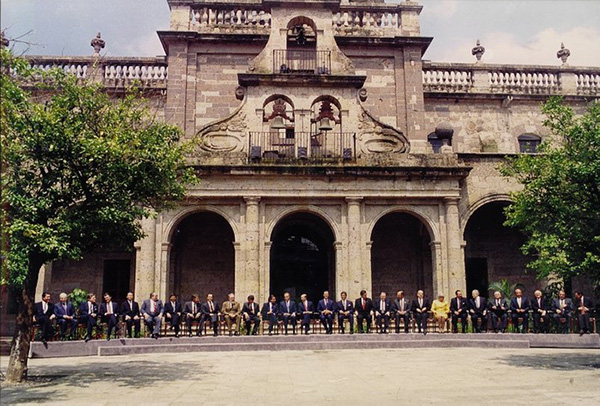This publication is part of a joint project of the Elcano Royal Institute and Instituto Português de Relações Internacionais (IPRI) to prepare a report on the bilateral relations between Spain and Portugal.
The event organised on 20 and 21 November 2017 by the Real Institute Elcano and the Portuguese Institute for International Relations of the Universidade Nova (IPRI) –‘Bilateral Relations between Spain and Portugal: Towards a New Dynamic on the Iberia Peninsula’– has generated a rich exchange of ideas, including on themes that are not usually dealt with. In this way, the objective of deepening the perspective of both countries on the past, present and future of the bilateral relationship has been achieved. Charles Powell and Patricia Lisa deserve credit for this wonderful initiative and its excellent organisation.
With respect to the Ibero-American framework, the discussions delved into the motivations behind the participation of Portugal in the first Ibero-American Summit in Guadalajara in 1991. Among these, those of a geopolitical nature stand out, especially the importance of creating a precedent for the subsequent establishment of the Community of Portuguese-Speaking Countries (CPLP), the intense diplomatic negotiations for which began in 1982 and came to a successful conclusion in 1996.
Neither could it be denied that much of the Portuguese attraction to the idea of Ibero-America was stimulated by the desire to compensate for the continental pull implied by its membership in the European Community in 1986 with a new Atlantic vector in its foreign policy.
At the same time, Portuguese participation in the Ibero-American project was certainly conceived of as another way to augment Portugal’s global political profile and soft power, as demonstrated by the presence of Antonio Guterres as a special guest –still in his capacity as the designated General Secretary of the UN– at the Cartagena Summit in 2016. This is also in line with the confirmation, apparent during the course of the event, that Portugal had achieved the notable goal of increasing its soft power during a time of economic crisis.
Finally, it is also important to note the tone of prudence in the language employed at Guadalajara: ‘We have decided to constitute the Ibero-American Conference of Heads of State and Government’ with the objective of ‘concerting the political will of our governments to convert the set of historical and cultural affinities which bind us into an instrument of unity and development based on dialogue, cooperation and solidarity’ (Guadalajara Declaration of June 19, 1991, § 1). It would be interesting to compare this with the Constitutional Declaration of the CPLP, which speaks of a ‘Community of States’, of a ‘pluri-national and national cultural reality’, of a ‘proper identity for Portuguese-speaking Countries’, of an “existing special relationship’, and of the Portuguese language as a ‘privileged medium for the diffusions of the cultural creations of its peoples’.
It is difficult to share the idea, referred to during the event, that the participation of Portugal in the Ibero-American space has been one of ‘low political profile’. In recent years, a number of official meetings of the SEGIB with the highest Portuguese political representatives (at the presidential, prime ministerial and even parliamentary levels) confirm this, as does the number of visits to Portugal by the high representatives of the SEGIB (two in 2015, found in 2016 and six in 2017). On the other hand, the presence of the Portuguese language within the SEGIB has allowed for a significant level of coordination and exchange of ideas around the idea of ‘Lusophony,’ the most recent of which has taken shape in the form of the first ‘Symposium on the Spanish and Portuguese Languages in the Ibero-American Space, in the Context of Linguistic Diversity’, which took place in June 2017. To this must also be added: ‘Braga, Ibero-American Youth Capital 2016” and “Lisbon, Ibero-American Cultural Capital 2017’.
For its part, the idea of creating an Ibero-American initiative for the diasporas, proposed by Professor Nancy Elena Ferreira Gomes, appears very attractive and promises to receive broad support among Ibero-American countries.
The event was also important in the decision to abandon the term ‘pan-Iberism’, used by some Spanish researchers to speak of the joint space of the Spanish and Portuguese languages. The negative historical connotation of this term became clear with the intervention of Professor Juan Carlos Jiménez Redondo, who contributed to the awareness of the rejection of this term in Portugal.
In is also important to share the idea of Ibero-America which has been proposed by the General Secretary, Rebeca Grynspan, who on various occasions has said that Ibero-America was born as a Summit and evolved into a Conference, and that it is now necessary to transform it into a Community. At the Symposium on the Spanish and Portuguese languages she declared:
‘Perhaps for other regional spaces and forums, culture and language might be considered secondary themes, issues which cede importance to political and economic factors. But this is not the case of Ibero-America. What we are, what unites us as a community and what drives us on into the future, is based precisely upon the culture and symbolic universe transmitted by the Spanish and Portuguese languages…. This bilingualism bears enormous potentials for our countries, but also a powerful message for humanity, in a polarised context of global fragmentation and division. It is a message of the power of diversity and the capacity for cooperation which is plural, open and horizontal. Our countries do not aspire to cultural or linguistic unity. On the contrary, we celebrate diversity…. (We do not aspire) to uniformity, but rather to dialogue and exchange between different forces and influences. It is there where change and innovation are possible. It is there where creativity flourishes. Human beings have not progressed because of the meeting of equals, but rather from the coming together of those who are different. To foment such an encounter, to assure ourselves that it be prolific and positive, is a mission of great transcendence in the world of our times. As Pessoa recommended: “be plural, like the universe”.’
This is the Ibero-America in which we recognise ourselves.



